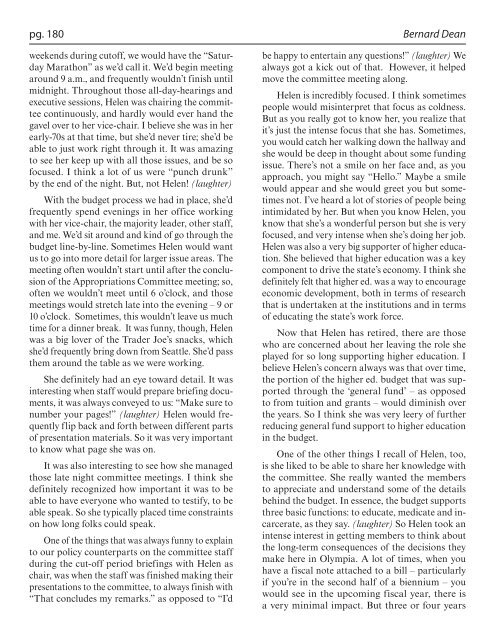Helen Sommers: An Oral History
Helen Sommers: An Oral History
Helen Sommers: An Oral History
Create successful ePaper yourself
Turn your PDF publications into a flip-book with our unique Google optimized e-Paper software.
pg. 180 Bernard Dean<br />
weekends during cutoff, we would have the “Saturday<br />
Marathon” as we’d call it. We’d begin meeting<br />
around 9 a.m., and frequently wouldn’t finish until<br />
midnight. Throughout those all-day-hearings and<br />
executive sessions, <strong>Helen</strong> was chairing the committee<br />
continuously, and hardly would ever hand the<br />
gavel over to her vice-chair. I believe she was in her<br />
early-70s at that time, but she’d never tire; she’d be<br />
able to just work right through it. It was amazing<br />
to see her keep up with all those issues, and be so<br />
focused. I think a lot of us were “punch drunk”<br />
by the end of the night. But, not <strong>Helen</strong>! (laughter)<br />
With the budget process we had in place, she’d<br />
frequently spend evenings in her office working<br />
with her vice-chair, the majority leader, other staff,<br />
and me. We’d sit around and kind of go through the<br />
budget line-by-line. Sometimes <strong>Helen</strong> would want<br />
us to go into more detail for larger issue areas. The<br />
meeting often wouldn’t start until after the conclusion<br />
of the Appropriations Committee meeting; so,<br />
often we wouldn’t meet until 6 o’clock, and those<br />
meetings would stretch late into the evening – 9 or<br />
10 o’clock. Sometimes, this wouldn’t leave us much<br />
time for a dinner break. It was funny, though, <strong>Helen</strong><br />
was a big lover of the Trader Joe’s snacks, which<br />
she’d frequently bring down from Seattle. She’d pass<br />
them around the table as we were working.<br />
She definitely had an eye toward detail. It was<br />
interesting when staff would prepare briefing documents,<br />
it was always conveyed to us: “Make sure to<br />
number your pages!” (laughter) <strong>Helen</strong> would frequently<br />
flip back and forth between different parts<br />
of presentation materials. So it was very important<br />
to know what page she was on.<br />
It was also interesting to see how she managed<br />
those late night committee meetings. I think she<br />
definitely recognized how important it was to be<br />
able to have everyone who wanted to testify, to be<br />
able speak. So she typically placed time constraints<br />
on how long folks could speak.<br />
One of the things that was always funny to explain<br />
to our policy counterparts on the committee staff<br />
during the cut-off period briefings with <strong>Helen</strong> as<br />
chair, was when the staff was finished making their<br />
presentations to the committee, to always finish with<br />
“That concludes my remarks.” as opposed to “I’d<br />
be happy to entertain any questions!” (laughter) We<br />
always got a kick out of that. However, it helped<br />
move the committee meeting along.<br />
<strong>Helen</strong> is incredibly focused. I think sometimes<br />
people would misinterpret that focus as coldness.<br />
But as you really got to know her, you realize that<br />
it’s just the intense focus that she has. Sometimes,<br />
you would catch her walking down the hallway and<br />
she would be deep in thought about some funding<br />
issue. There’s not a smile on her face and, as you<br />
approach, you might say “Hello.” Maybe a smile<br />
would appear and she would greet you but sometimes<br />
not. I’ve heard a lot of stories of people being<br />
intimidated by her. But when you know <strong>Helen</strong>, you<br />
know that she’s a wonderful person but she is very<br />
focused, and very intense when she’s doing her job.<br />
<strong>Helen</strong> was also a very big supporter of higher education.<br />
She believed that higher education was a key<br />
component to drive the state’s economy. I think she<br />
definitely felt that higher ed. was a way to encourage<br />
economic development, both in terms of research<br />
that is undertaken at the institutions and in terms<br />
of educating the state’s work force.<br />
Now that <strong>Helen</strong> has retired, there are those<br />
who are concerned about her leaving the role she<br />
played for so long supporting higher education. I<br />
believe <strong>Helen</strong>’s concern always was that over time,<br />
the portion of the higher ed. budget that was supported<br />
through the ‘general fund’ – as opposed<br />
to from tuition and grants – would diminish over<br />
the years. So I think she was very leery of further<br />
reducing general fund support to higher education<br />
in the budget.<br />
One of the other things I recall of <strong>Helen</strong>, too,<br />
is she liked to be able to share her knowledge with<br />
the committee. She really wanted the members<br />
to appreciate and understand some of the details<br />
behind the budget. In essence, the budget supports<br />
three basic functions: to educate, medicate and incarcerate,<br />
as they say. (laughter) So <strong>Helen</strong> took an<br />
intense interest in getting members to think about<br />
the long-term consequences of the decisions they<br />
make here in Olympia. A lot of times, when you<br />
have a fiscal note attached to a bill – particularly<br />
if you’re in the second half of a biennium – you<br />
would see in the upcoming fiscal year, there is<br />
a very minimal impact. But three or four years
















